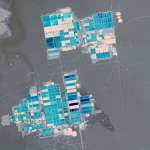Russia: Moscow Eyes Oil Markets in Asia
MOSCOW -- Moscow is planning to develop new markets in Asia for its crude oil and become an alternative to the volatile Middle East. In the blueprint are big pipeline projects to boost its oil exports to countries such as Japan -- the second biggest importer of oil in the world after the United States -- and China, the world's third largest oil consumer.
At the moment, Russian oilmen decline to speculate whether their bold pipeline vision could be affected by the Iraq war. "It is too early to foresee if the consequences of war or changes in Iraqi oil exports policy may affect the pipeline project," Rosneft chief Dmitry Panteleyev told IPS.
In fact, Victor Kalyuzhny, Russia's deputy foreign minister and special envoy on the Caspian, told journalists on Monday that the war may boost the world market demand for crude.
Rosneft seems to remain confident that its pipeline project, which is a topic of debate in the oil industry, will be economically viable.
Russia is looking at two competing plans.
One, backed by Russia's top oil firm Yukos and China, is a $2.5 billion 2,400-kilometer extension of the existing network from near Irkutsk to Daqing, China. The other, backed by state-run oil firm Rosneft and Japan, would cost $5.2 billion and circumvent China, running 3,800 kilometers to the Russian Far East city of Nakhodka on the Sea of Japan.
Until earlier in March, it looked as if the China-backed plan would prevail. However, the Russian Energy Ministry eventually recommended that the Japanese and Chinese proposals be combined into one project, building the pipeline to Daqing and then extending it to Nakhodka.
Moscow is thus trying to satisfy both China and Japan in an attempt to hammer out a geopolitical compromise.
The envisioned pipeline would eventually pump 1.6 million barrels of oil a day from fields near the shores of Lake Baikal, north of Mongolia, to Nakhodka on the Sea of Japan, but first a spur would be built to Daqing, the Chinese oil production center some 300 kilometers south of the Russian border.
The pipeline to Nakhodka would run entirely through Russia. The huge project would give Russian oil companies a major boost in export capacity. It also would position Russia to become a huge filling station for the Asia-Pacific region.
Both Beijing and Tokyo have reportedly said they are ready to finance their links and both have been hoping the new pipeline will help diversify oil imports, the need for which has been highlighted by the conflicts in the Middle East.
Mikhail Khodorkovsky, Yukos chief executive officer and a leading backer of the Chinese project, said Russia did not have "enough oil" at the moment to justify the construction of a long and hugely expensive pipeline to the Pacific.
Yukos hopes to build a 600,000 barrel per day oil pipeline from Western and Eastern Siberia to Daqing in northeast China by 2005. Khodorkovsky has insisted that Russia may lose at least $3 billion of budget revenues a year from 2005 if a Chinese pipeline is postponed.
Yukos is already trying to gain a share of the Chinese market before the construction of the Angarsk-Daqing pipeline, scheduled for 2005, which will allow access to other oil companies.
However, Russia's state-owned Rosneft criticized the plan because, its officials said, the price of Russian oil in China would "not be determined by the market". Another opponent of the China pipeline had been Transneft, the state-owned pipeline company.
Transneft has said a pipeline to the Pacific would be safer and more flexible, but also said it was ready to fulfill any government decision.
Still, not all officials are convinced. Russia's Energy Minister Igor Yusufov said it was not clear Russia's oil and gas reserves in Eastern Siberia and the Far East were enough to justify extending the pipeline network eastward.
According to the Energy Ministry, some $12 billion of investments in geological exploration in Eastern Siberia are needed to secure enough supplies for Angarsk-Nakhodka pipeline and to hike the output in the region up to 100 million tonnes a year by 2020.
At the moment, crude supplies up to 75 million to 80 million tonnes a year from Russia' s main oil fields in Western Siberia are needed to justify the pipeline, the ministry has said. Current oil reserves in the two regions are estimated at about 1 billion tonnes.
Yet despite reservations, the ministry seems to favor energy ties with Japan. On March 28, Russia's Energy Ministry said in a statement it had finalized a 10-year programme of energy cooperation between Russia and Japan.
The blueprint involves cooperation in building oil and gas pipelines, tapping Siberian hydrocarbon reserves and other projects.
"Russia needs new pipelines to boost crude exports to China and other East Asian countries," argued Valery Nesterov, oil analyst of Troika-Dialog, Moscow-based brokerage. Russia's current export pipelines can pump some 180 million tonnes of crude a year and are being used to capacity, he said.
As Russian oil companies press for unprecedented output growth, existing export routes by rail, sea and land are heavily congested.
Building new export pipelines reaching East Asia would allow Russia to boost exports to 100 million tonnes annually, helping pave the way for a significant hike in production from 380 to 500 million tonnes by 2010.
However, it remains to be seen whether huge Asian pipeline projects can help Russia fulfill its dream of becoming the world's top oil exporter, bigger even than Saudi Arabia, which has the world's biggest oil reserves.
- 107 Energy



